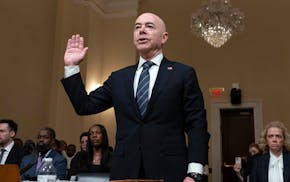Running for a third term as Minnesota's attorney general, DFLer Lori Swanson suddenly finds herself fending off not just a Republican challenger, but also two third-party candidates with the potential to drain support from left-leaning voters.
Andy Dawkins, a former DFL House representative from St. Paul, joined the race Tuesday, but as a Green Party candidate. Also running is Independence Party candidate Brandan Borgos, a Minneapolis attorney whose previous political experience has been in advocating for legalization of marijuana for recreational purposes, along with newly endorsed Republican Scott Newman, a state senator from Hutchinson.
"Big money is at the bottom line of what gets passed into law these days," said Dawkins, who served in the Legislature for 15 years and who ran as the DFL endorsee for St. Paul mayor in 1993. "This is the beginning of the end of big money in politics in Minnesota."
Minnesota DFL Chairman Ken Martin said he's not worried that Dawkins and Borgos could siphon off typically Democratic voters and potentially leave Newman the winner in a divided field.
"Attorney General Swanson is one of the highest vote getters in our state and one of the most popular politicians we have on our ticket," Martin said. "I'm not worried one bit about her chances for re-election."
DFLers have had a lock on the Minnesota attorney general's office longer than any other statewide elected position. The last Republican to hold the seat was Douglas Head, who served from 1967 to 1971.
"Maybe the law of averages will help me a little bit," said Newman, who was finishing up a tour of the state Tuesday with other endorsed Republican candidates for statewide offices. "I honestly don't know why the DFL has had such a lock on the attorney general's office for so long."
Newman said he believed Swanson has allowed partisan politics to influence her work as attorney general.
Asked for an example, he brought up an unsuccessful 2012 lawsuit from the American Civil Liberties Union and League of Women Voters to keep the voter ID amendment off the election ballot. Though Republican legislative majorities had voted to put the amendment on the ballot, Swanson declined to argue against the lawsuit.
But when DFL Secretary of State Mark Ritchie tried to alter the language of the ballot title in a way Republicans considered unfavorable, Newman said, Swanson went to court on his behalf. "The AG should not be picking sides like that," Newman said. "You don't decide to defend on the basis of your political ideology.
Swanson's campaign did not respond to requests for comment. At the state DFL convention in Duluth on Saturday, Swanson put the heaviest emphasis on the consumer protection responsibilities of the office, citing efforts to rein in aggressive debt collection agencies, financial scams targeting senior citizens and unscrupulous credit card companies.
Swanson won office in 2006, after serving as assistant attorney general under her predecessor, Mike Hatch.
A private lawyer in Minneapolis, Dawkins is married to former state Sen. Ellen Anderson, who recently left her job as an energy policy adviser to Gov. Mark Dayton for a post at the University of Minnesota Law School. Dawkins said that gave him license to finally split with the DFL for good and run with the Green Party, the one-time political home of frequent presidential candidate Ralph Nader.
Dawkins said his dissatisfaction with Democrats has grown along with the clout moneyed interests increasingly wield in major party politics. What gets pushed aside, he said, is genuine change on issues like climate change and surveillance of private citizens.
"I love Democrats," Dawkins said. "I'm married to one. But I need to see some action."
The only Green Party member currently holding prominent political office in Minnesota is Minneapolis City Councilman Cam Gordon. Dawkins said he hoped his candidacy could help the Greens grow as a political force. He said Anderson remains a loyal Democrat, but he can win her vote in November.
Borgos until recently was chairman of the board of Minnesota NORML, which lobbies for legalization of marijuana. This year's slate of Independence Party candidates all are running on a platform of legalizing marijuana for all users, beyond the medical marijuana bill recently signed into law by Gov. Mark Dayton.
Borgos said he wants to repeal or reshape drug forfeiture laws, which he said are an undue burden on people of limited economic means.
"I believe there is a place for the attorney general to make a stand on these issues," he said.
Dawkins also said he supports "sensible legalization of marijuana." He has a history with the issue: In 1993, as a candidate for St. Paul mayor, Dawkins admitted in a debate to having smoked marijuana within the previous five years. He went on to lose the race to fellow Democrat Norm Coleman, who switched to the Republican Party three years later.
Asked the same question on Tuesday, Dawkins declined to answer.
"You know, it was a dumb question then, and it's a dumb question now," Dawkins said. "Are you going to ask if I drink sugar with my coffee?"
Patrick Condon • 651-925-5049
New Black congressional district in Louisiana bows to politics, not race, backers say
Trump trial jury selection process follows a familiar pattern with an unpredictable outcome
Climate change concerns grow, but few think Biden's climate law will help, AP-NORC poll finds
